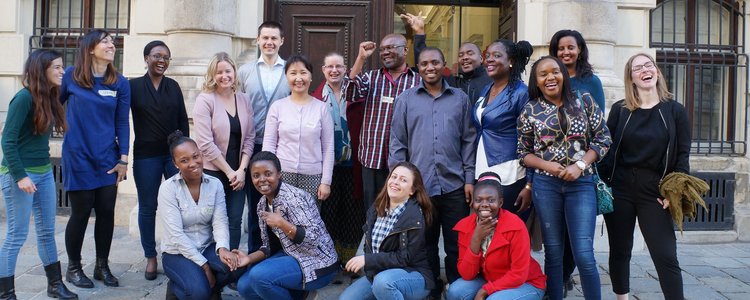Students and researchers from 16 countries participated in this workshop that was jointly organised with Amnesty International on 6th of April 2019. In order to defend human rights it is important to have a sound knowledge, therefore Eliza Klein-Diaz and Julia Streimelweger from Amnesty International presented the human rights concept. Human rights are indivisible and apply to all of us, simply because we are human beings and regardless of the ethnicity, gender, religion, etc. The first international agreement was the UN Universal Declaration of Human Rights in 1948, followed by the International Convention of Civil/Political Rights and the International Convention of Economic/Social and Cultural Rights in 1966. People sometimes argue that human rights are a western concept and therefore cannot be transferred to other countries. However, they are part of international law and national governments have committed themselves to observing them, many of them have also ratified respective human rights laws.
Then Elshaday Kifle Woldeyesus, a current PhD candidate at the University Graz and APPEAR scholar talked about the issue of women and human rights. In her presentation she included specific examples from her previous work in an HIV/AIDS orphan support project with vulnerable rural adolescent girls and a community service programme at the Center for Human Rights at Addis Ababa University in Ethiopia. In most countries women have by law equal opportunities as men. However, the question is if this translates automatically in equal outcomes. Elshaday recommended that we have a closer look at differences in the life realities of girls and women and actual barriers they still have to face.
The theoretical inputs were followed by a group work on what a human rights defender looks like. Personal stories of activists, who were in the focus of global campaigns of Amnesty international, were discussed. One example was Mudawi Ibrahim Adam, a Sudanese human rights defender who is known for bringing attention to human rights violations in Sudan. Another example was Maxima Acuha, a farmer in Peru who has braved harassment and violence from a mining company for refusing to leave her land. For her bravery, she has been awarded the 2016 Goldman Prize, the world's most respected environmental award. We concluded that a human rights defender is “a person, who acts individually or in a group to promote and protect human rights on a regional, local, national or international level in a peaceful manner, which means without violence, hatred or discrimination.”
Afterwards the participants shared personal experiences when they stood up for human rights but also incidents when they were not able to do so. Sometimes we might feel overwhelmed by this kind of atrocities that take place all over the world. Therefore, it was agreed to start with human rights issues that are closest to our homes. We can use our voice to criticise human rights violations publicly, to start conversations with friends, colleagues or even strangers, to join groups, protests and campaigns. In our own life we have to include different people and speak up against discrimination. Our governments must be held responsible and finally we should always focus on the true cause of problems and understand the broader context.
Trainers / Speakers
Elshaday Kifle Woldeyesus is a lecturer at Addis Ababa University. She was Hubert H. Humphrey Fulbright Fellow for 2015/2016 at American University Washington College of Law. Before joining the Center, Woldeyesus was a researcher at the University for Peace – Africa Programme and previously worked for different non-governmental organizations. She holds a master’s degree from the United Nations mandated University for Peace in Costa Rica.
Elisa Klein Díaz studied international relations in Spain and completed her Master Degree in Human Rights at the University of Vienna. Since 2017 she is a human rights educator with Amnesty International Austria.
Julia Streimelweger is an activist for human rights education since 2015 and studies political science at the University of Vienna. She focused her studies on women rights, Gender equality policy in International Relations and the European Union. Currently she is writing her Master Thesis on Problems of Social Reproduction for local politicians with a focus on gender specific challenges.
